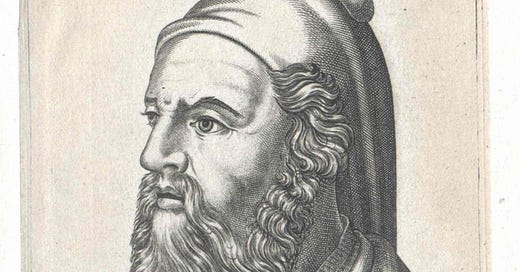Pythagoras: Mathematician and Prophet
Pythagoras is one of the most interesting and puzzling men in history.
Bertrand Russell's quip about Pythagoras starts from a narrow observation of his twin role as mathematician and prophet. He became the leader of a group of religious disciples in Sicily ca. 500 BCE, but he also started a competing society of mathematicians. The modern world sees religion and mathematics, and for that matter most fields of academic study, as fundamentally distinct. So it's confusing to imagine a man whose personal history is so inextricably linked to these opposing forces. For instance, as we saw last time, one of his greatest contributions to Western thought is the Pythagorean Theorem; yet simultaneously, he "founded a religion, of which the main tenets were the transmigration of souls and the sinfulness of eating beans."
Pythagoras, hater of beans. (PICRYL Public Domain Image)
Part of what makes Pythagoras so interesting, however, is the lack of contradiction he saw in the forces of religion and mathematics. In identifying how both of these forces shaped Pythagoras' life, we can better understand the philosophical trajectory of the West for millennia after his death. But first, we must explore some context:
Early Religions
Of the several thousand years of human history and especially religion before the rise of classical Greek civilization, we ultimately know very little, due to the lateness of the invention of writing and incomplete archaeological record. What we do know, in brief, is that ancient religions were animist, regarding natural forces as imbued with purpose, and polytheistic. Specific natural forces were given anthropomorphic characteristics and superhuman powers, and people made offerings to these gods in exchange for safety, a good hunt, etc. Before the rise of agriculture, there was little need or economic incentive for a priest class, as there was insufficient capacity for a priesthood (everyone had to work for their food!) and insufficient group size to encourage much job specialization at all.
Agriculture changed things dramatically. States arose, including in the so-called Fertile Crescent of Mesopotamia and in the Nile Valley in Egypt. As they grew, power was consolidated into a monarchy that was supported by a priesthood. This led to fundamental changes in religions. Russell tells us, "Where a religion was bound up with the government of an empire, political motives did much to transform its primitive features. A god or goddess became associated with the State, and had to give, not only an abundant harvest, but victory in war." Religion became a state affair and was central to maintaining the state's power structure. It was, in short, centered on the ruling powers and tied directly to material circumstances.
Beginning in the early first millennium BCE in Asia Minor and the Aegean, a different kind of religion began to emerge. Greek religion is often associated with the Olympian pantheon of Zeus, Poseidon, Hades, Hera and the rest. This had been the religion of state, of the ruling class of Greek society. In general, however, it seems that the Olympian gods were not widely or genuinely worshiped by the bulk of the population. (Tellingly, Homer treats the Olympian gods with at best irreverence, at worst contempt.)
Instead, much genuine religious feeling in ancient Greece is devoted at first to Dionysus, or Bacchus, the god we associate with wine and debauchery. Russell sees the worship of Dionysus as a reaction against the culture of "prudence," an experience of passion in opposition to civilization. This pattern has played out throughout history: wherever there are naysayers advising caution and moderation "for the greater good,"there is some measure of popular resistance at the individual level. Think bootlegging, or illegal alcohol production, and speakeasies during American Prohibition. This resistance often takes a decidedly immoderate form.
Caravaggio's (1595) Bacchus. So sensual. (Wikimedia Commons)
Consider the Bacchic ritual. Through intoxication, the worshiper feels an individual connection with divinity. This is diametrically opposed to the notion of religion as centered on the ruling class or tied to earthly outcomes. Religion was individual, mystical, personal. Russell tells us that the Bacchic ritual "produced what was called 'enthusiasm,' which means, etymologically, having the god enter into the worshipper, who believed that he became one with the god."
The importance of this turn of religion from collective to individual, from power-solidifying to power-disrupting, can't be overstated. Russell tells us:
[The worship of Dionysus] greatly influenced many philosophers, and even had a part in shaping Christian ideology...It contained in germ a wholly new way of looking at man's relation to the world...[T]he phenomenon of ecstasy suggested that the soul was something more than a feeble double of the self...
It's easy to draw a straight line from recognition of the power of a mystical passion, to the invention of the 'soul,' to the Christian doctrine of salvation for all souls, to Western individualism as expressed throughout modern history.
From Bacchus to Orpheus
Orpheus is, as Russell says, a "dim but interesting figure." He was a priest and philosopher, likely from Crete, and he was a reformer of Bacchic doctrine. Chiefly, Orphics substitute mental for physical intoxication. They tame and refine some of the sharp edges of Bacchic practice.
We can thank the Orphics for promoting ideas such as the transmigration of souls and 'churches,' religious communities that anyone could join. Regarding the transmigration of souls, they taught that "the soul hereafter might achieve eternal bliss or suffer eternal or temporary torment according to its way of life here on earth." Again, we continue to see the influence on Christianity - this is an early notion of heaven and hell, which individuals will attain according to how they live. This is profoundly alien to earlier religions, whose focus was protecting the power of the State and material conditions on earth.
As for 'churches,' unlike the priests of Olympian cults, the Orphics created communities in which "anybody, without distinction of race or sex, could be admitted by initiation." This shift from a state-based religion, or an exclusionary religion, is profound in that it values people as individuals and invites them to join in a philosophical project. People have to think in order to choose the Orphic church! This is so remarkable that, as Russell says, "from [the Orphics'] influence arose the conception of philosophy as a way of life."
From Orpheus to Pythagoras
The lineage of Bacchic and Orphic doctrines continues with Pythagoras. Russell outlines the evolution of thought:
This mystical element entered into Greek philosophy with Pythagoras, who was a reformer of Orphism, as Orpheus was a reformer of the religion of Bacchus. From Pythagoras Orphic elements entered into the philosophy of Plato, and from Plato into most later philosophy that was in any degree religious.
We might laugh at the idea that a religion forbidding the consumption of beans had any influence at all. This in itself demonstrates that Pythagoras' religion, in a narrow sense, failed to survive to the present - or even for more than a generation after his death. More broadly, however, we can see his influence on the development of later religions, especially Christianity.
Pythagoras, like the Bacchics and Orphics before him, practiced an individual and mystical religion. Unlike the Bacchics, however, he found his ecstasy in contemplation, specifically in mathematics. You might be familiar with this sensation. If you have ever had the experience of suddenly understanding a mathematical concept that you had been struggling with, you might have experienced a rush, a euphoric sense of unlocking a key to the universe. This is the feeling of understanding, of communing with the eternal world through intellectual effort, that is the basis for Pythagorean mysticism.
Speaking of contemplation, we have Pythagorean mysticism to thank for the modern meaning of the word "theory." Originally an Orphic word, one classicist interprets the Orphic meaning as "passionate sympathetic contemplation." In the Orphic sense, this contemplation was synonymous with communing with God. Pythagoras, however, sees this notion of "passionate sympathetic contemplation" as "intellectual, and issued in mathematical knowledge." Theory becomes a truth about the world, as revealed to the individual who has unlocked it through contemplation.
Not only is theory truth for Pythagoras, it is eternal truth. Such is the genius of Greek mathematical reasoning: By contemplation, which is shorthand for deductive reasoning from intuitive axioms, mathematical knowledge that is far from intuitive is proven to be not only true, but eternal. The Pythagorean Theorem is just one example of this phenomenon; Euclidean geometry is another. In fact, the discoveries of Greek mathematicians overshadowed the ensuing 2,000 years of mathematical thought, as Western thinkers until the Enlightenment were in awe of the Greeks' genius and felt that there were no more eternal mathematical truths to be discovered.
Remember the Pythagorean Theorem? (Wikimedia Commons)
Of course, most modern religions rely on the conception of eternal truths; this is yet another connection between Pythagorean mathematics and theology. It's important to consider, however, that pre-classical Greece, religions were not eternal--they were concerned with the power structure of the State, with material conditions, or with passionate communion. In fact, Russell tells us that "[t]he whole conception of an eternal world, revealed to the intellect but not to the senses, is derived from [Pythagoras]."
As for the influence of Pythagoras' combination of mathematics and theology? Bertrand Russell argues that this combination, "which began with Pythagoras, characterized religious philosophy in Greece, in the Middle Ages, and in modern times down to Kant." Influential philosophers including Plato, St. Augustine, Thomas Aquinas, Descartes, and Kant take the Pythagorean premise of blending religion and reasoning, and use it to create a "culture of intellectualized theology." It is only in the very recent past, in fact, that religion and reasoning have become understood as opposing forces.
Perhaps the strongest argument for emulating Pythagoras in contemporary life is the virtue of interdisciplinary thinking. By combining two unlikely fields, Pythagoras influenced generations of thought and forever improved our understanding of mathematics. In an increasingly complex and specialized world, it's impossible to see any given problem from a single perspective. By synthesis and broadened discourse, we can understand the world around us more fully, coming ever closer to truth.






